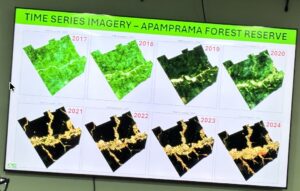
The government’s decision to withdraw a specialised police taskforce from illegal mining sites risks fuelling fresh environmental destruction, a leading advocacy group has warned.
The Anchoring Democracy Advocacy Movement Ghana (ADAM-GH) said the Inspector-General of Police’s anti-galamsey unit has been a visible deterrent to operators of unregulated mines. Its removal, the group argued, threatens to undo hard-won gains in curbing the pollution of rivers, forests and farmland.
“The fight against galamsey requires consistency and firmness. Any mixed signals only embolden the very actors destroying our environment,” ADAM-GH said in a statement on Monday. “Pulling the taskforce out creates room for illegal miners to intensify their activities.”
Government defends the shift
The Ministry of Lands and Natural Resources rejected suggestions that the withdrawal signals a retreat. Officials said the anti-galamsey campaign remains active and will be carried forward through new security arrangements and community-based monitoring rather than a police-led task force.
Government Communications Minister Felix Kwakye Ofosu stressed that President John Dramani Mahama never promised a quick fix.
“To be fair, if you want to assess a president, you have to take him by his own words and actions,” he told Joy FM’s Super Morning Show. “President Mahama did not give any timelines for ending galamsey. He has always acknowledged the complexity of the problem and said it cannot be eradicated with the wink of a magic wand.”
Call for consistency
ADAM-GH remains unconvinced. The group said visible police presence is crucial to enforcing mining laws and deterring heavily armed operators.
“The government must reset the agenda without twisting it into something else,” the statement added, urging the president to reinstate the task force as proof of his commitment to environmental protection.
Illegal artisanal mining—known locally as galamsey—has long plagued Ghana’s gold-rich regions, leaving scarred landscapes and toxic waterways. Environmental advocates fear that without sustained enforcement, the country could lose hard-fought ground in a battle they describe as essential to safeguarding both livelihoods and ecosystems.






